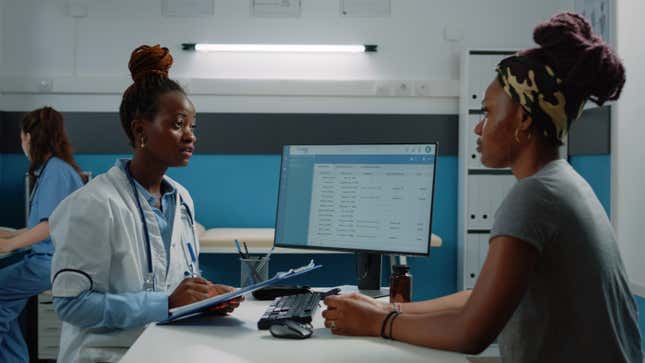
In many areas of the medical field, Black people go underrepresented as professionals but overrepresented as patients and often need an advocate. In maternity care, for example, Black women have gone to midwives and doulas to make sure they are taken care of during pregnancy to postpartum. Fortunately, cancer patients of color also have advocates thanks to the members of the Delaware’s cancer treatment centers.
According to NPR’s report, these people are ‘patient navigators’ who provide aid and guidance to patients who have trouble accessing care as well as paying for it. NPR highlighted Margarette Osias, navigator for the Delaware Breast Cancer Coalition, as an example.
From NPR:
Osias schedules exams for patients, sends them reminders and arranges for rides to get there. A bilingual Haitian Creole speaker herself, Osias also deals with insurance — or even goes with patients to appointments to serve as a translator.
Whatever obstacles the patient faces, “I am basically the connection between that individual and receiving that care,” Osias says.
Patient navigators like Osias play a critical role in how the state of Delaware has reduced its cancer death rates and narrowed — in some cases even eliminated — racial disparities in some forms of cancer.
Delaware’s Screening for Life program was set up to provide financial assistance for cancer screenings as well as up to two years of treatment if cancer is found, reported NPR. In addition to financial help, the program also aims to make sure communities of color are getting access to necessary care. That’s also where the navigators come in.
Per NPR’s report, patient navigators go into communities where screening rates are low and post flyers, set up mobile screening and meet with community leaders. In addition, they draw patients toward seeking medical assistance by building trust.
From NPR:
Having patient navigators on the front line is essential, says family nurse practitioner Nadya Julien.
Julien opened Tabitha Medical Care three years ago, and started working with navigators like Osias. The clinic serves mostly her fellow Haitians, as well as some Latino immigrants. She says many are illiterate and didn’t grow up with preventative medicine back home, which puts them at especially high risk of getting late-stage cancers.
Tracking data on things like why people miss a cancer screening or what forms of communication are most convenient to confirm appointments all contribute to a navigator’s ability to access what patients need, per NPR. However, sometimes navigators and cancer treatment centers must allocate funds for patients who need treatment and don’t have insurance. Delaware is looking to put more funding into navigators to help even more patients, reported NPR.
Patient navigators should be more common in every state given the national concern for access to healthcare in the Black community. Among other medical crises besides cancer, Black people and people of color still lack trust in the medical system due to being overlooked or misdiagnosed. While we wait for more people who look like us to enter the field, we deserve someone to guide us toward proper care in the meantime.

